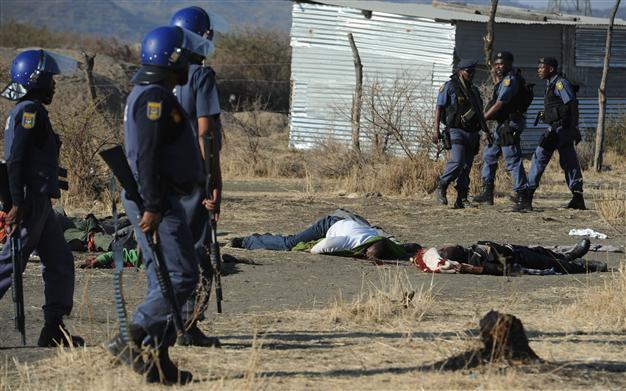Marikana probe says South African police lied about shootings
JOHANNESBURG - Agence France-Presse

) A picture taken on August 16, 2012 shows police surrounding miners killed during clashes between protesting miners and police near a platinum mine in Marikana. AFP photo
A South African commission of inquiry accused police of lying about the shooting dead of 34 striking miners in Marikana last year, in a searing criticism of their conduct Sept. 19."We have obtained documents which in our opinion demonstrate that the [police] version of the events at Marikana... is in material respects not the truth," the commission said after gaining access to police hard drives.
Police say they were acting in self defence against armed miners.
The commission also accused police of falsifying documents, hiding documents, concealing evidence and giving a false account of events.
"We have obtained documents which give the impression that they are contemporaneous documents, but which appear in fact to have been constructed after the events to which they refer," the commission's investigators said.
"Absent a convincing explanation, the material which we have found has serious consequences for the further conduct of the work of this commission," it added.
Statement not made 'lightly'
A spokesman for the police ministry declined to comment. "It's before a commission of inquiry, that is sub judice," Zweli Mnisi told AFP.
The damning statement against the police is unusual, since the commission has not yet wrapped up its work. "We do not make this statement lightly," it said.
The commission said it will adjourn until next Wednesday to enable investigators to trawl through the "thousands of pages".
It took note the police members had handed over the information willingly.
Inquiry spokesman Tshepo Mahlangu told AFP the allegations "have not been tested as yet by the commission." "The judge clarified the matter to say that these are not findings of the commission, it is evidence of some wrong-doing that the investigators have come across." President Jacob Zuma appointed the commission to investigate the police killing of 34 striking miners on August 16 last year at a mine run by platinum giant Lonmin.
In the run-up to the deaths, at least 10 other people - including two police officers - were killed during the highly charged strike.
But controversy has plagued the body from the start. No relatives of the dead were present at the opening and it had to adjourn until the government transported family from far-flung rural areas to attend.
Its initial four-month mandate had to be extended twice and the new information may have jeopardised a new October deadline.
Last Sept. 12 hundreds marched to the seat of government in Pretoria demanding the state pay legal fees for about 270 injured or arrested miners appearing at the inquiry.
Critics said the commission's findings would be biased if the survivors could not have lawyers.
The government has blocked efforts to pay the counsel, who worked for free for months but withdrew pending a court bid which they lost last month.
A string of witnesses and police officers have appeared before the commission, including national police commissioner Riah Phiyega, with most offering only circumscribed accounts of events.
Phiyega remained evasive and deflected questions under cross-examination, but denied having ordered the killings and said the police had acted in self-defence.
No officer has been charged for the deaths, and only North West province Deputy Police Commissioner William Mpembe has taken direct responsibility for police actions.
In June Mpembe said he was responsible for the decision to initiate "phase three" of police operations, to disperse striking Lonmin platinum miners.
















